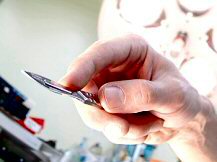 A new laser technology used with robotic prostate cancer surgery may significantly reduce the risk of incontinence and erectile dysfunction, say urologic surgeons at New York-Presbyterian Hospital and Columbia University Medical Center. Their findings, published in the Journal of Endourology, represent the first practical evaluation of the use of the CO2 laser in prostate cancer surgery.
A new laser technology used with robotic prostate cancer surgery may significantly reduce the risk of incontinence and erectile dysfunction, say urologic surgeons at New York-Presbyterian Hospital and Columbia University Medical Center. Their findings, published in the Journal of Endourology, represent the first practical evaluation of the use of the CO2 laser in prostate cancer surgery. "The precision of movement available through robotic surgery is already helping reduce the risk of sexual side effects, and the early evidence is that CO2 lasers will help us be even more accurate - especially when preserving the sensitive nerve areas necessary for sexual function and urinary continence," says Dr. Ketan Badani, director of robotic urologic surgery at New York-Presbyterian Hospital.
In the procedure, the robotic instrumentation removes the patient's prostate and is aided by the laser, which is used to dissect the plane between the nerves and the prostate, freeing the nerves and preserving them.
"Traditionally, we cut, clip or cauterize the tissue around the prostate nerves. However, these techniques can cause irreversible damage due to traction or heat injury," explains Dr. Badani. "The CO2 laser may reduce this risk because it is low-heat and doesn't require much manipulation of the nerves."
Dr. Badani says that laser patients experienced a return of urinary continence better than the norm, something he found "extremely encouraging." Future research will determine if the technology can improve outcomes with regard to the ability of men to sustain an erection, and its long-term ability to prevent cancer recurrence.
Related:
New Procedure Minimizes Incontinence After Prostatectomy
Most Men "Emotionally Unprepared" For Prostate Removal
Sex Life A Major Concern After Prostate Cancer
Sexual Dysfunction Widespread In Prostate Cancer Patients
Source: New York- Presbyterian Hospital





